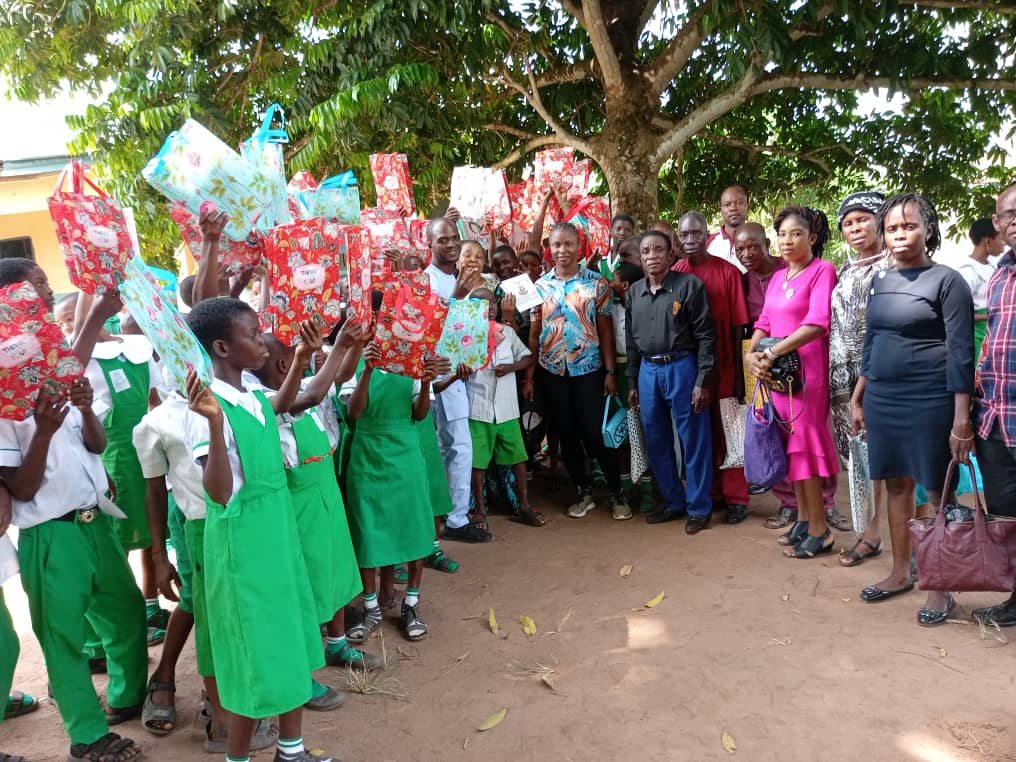Education
Education Sector and Nigeria’s Revolving Underdevelopment Doors

By Jerome-Mario Chijioke Utomi
One recent occurrence that typifies the nation’s education sector as an area in urgent need of help is the current shoddy state of Ologbo Primary and Secondary Schools, Ologbo, Obarentin community in Ikpoba-Okha Local Government Area of Edo State, formerly called Rubber Research Institute of Nigeria Primary and Secondary School, Ologbo.
In addition to signalling the gory tale of poor leadership, neglect and outright abandonment of responsibility by the Edo State government, the pictures and accompanying commentaries diverted attention from real threat deserving of healthy and appropriate fear, the federal government’s protracted inability to resolve their impasse with the Academic Staff Union of Universities (ASUU). It is more than anything else the ugly awareness at the school sowed confusion that portrays the Edo state as a state where leadership has drained people’s will and is now left with weakened rational character.
Expectedly also, many have risen in staunch defence of the Governor; saying that blame in the present circumstance may not be the smart thing to do; for when the verdict is passed on someone, it blocks the possibility of knowing who the person is and definitely creates biases, sentiments, prejudice, and also makes the mind become impervious and closed towards either seeing the good sides of the person or the bad sides of the person.
To others, the Governor should in the interim be excused because when it comes to making decisions or pursuing purposeful initiatives, leaders naturally fall victim to the trap of unexpected limitations such as inadequate funds among others.
To the rest, achieving sustainable development in a sector such as education is a systemic thing that takes time. Therefore, the Governor needs to be allowed more time to perform before subjecting his performance to critical scrutiny.
Whatever the true position may be, the truth is this piece’s latest condemnation of Governor Obaseki’s poor leadership habit is both natural, neutral and perceptual.
The reason is simple. Experience via observation has shown that in Nigeria, particularly in the Niger Delta region, leaders are never mentally prepared for the task of leadership. They seem to forget that the more preparation, planning and activation of the execution process they make, the better they perform in the task of leadership.
Supporting the above assertion is the awareness that when one spends time thinking about how we approach leadership in Nigeria and asks important questions about how leaders in Nigeria set their priorities, time and funds, it becomes easy to situate the fact that the hallmark of poor performance in Nigeria is not Obaseki specific.
Take, as an illustration, a while ago, in a particular intervention, this author highlighted pictures of a similar shoddy state and wicked neglect of Oyoko Primary School, Abavo, Ika South Local Government Area of Delta state.
Like the Ologbo Primary and secondary schools situation, the referenced piece underlined disturbing pictures which showed visibly distressed structures with fallen ceilings, windows and doors. The piece concluded by concluding that from the pictures and accompanying commentaries, it cannot be characterized as an overstatement to describe such a ‘scene’ as deplorable, dehumanizing, troubling, in bad light bracingly in contravention of the international best standards and most importantly, a reality that all well-meaning Deltans including our dear Governor should worry about.
Broadly speaking, there are so many reasons why this author is particularly interested in bringing to the fore these poor courses of action/ inaction chosen ahead of logic by the public authority to address the nation’s education sector; their definition of the problem, the goals to be achieved, or the means chose to address the problems and to achieve the goals.
By analysing each of these elements, in turn, it becomes easy to understand the essential ingredients that made great nations what they are today, as well as answer questions as to why others, such as Nigeria, are unsuccessful.
To explain this point, it is believed that policies, plans and strategies are fundamental to the progress and development of countries, yet, right from independence, the problem with education in the country very much lies with underfunding, payment of lip service to, and inconsistency in policies driven by several panels set up by the government to recommend measures to enhance the quality of education in the country. This problem is not so much with the recommendations of the various panels but their poor implementation by those entrusted to do so.
If not bad policy and poor implementation, how do we explain governments’ inability to heed the United Nations Educational Scientific, and Cultural Organisation (UNESCO) budgetary recommendation on education? What other expression shall we say of a country’s education where researches are not adequately funded and yet, the President allowed hundreds of millions to go into replacing his plates and cutlery yearly? And what shall we expect from an educational ministry headed by someone who is not an educationist? This may however not be the only explanation.
As to what should be done, we must recognize two realities.
First and very fundamental, that is like in a business where no organization can grow consistently faster than its ability to get enough of the right people to implement such growth. likewise, we must admit that with the education sector’s present state, it will be difficult if not impossible to develop disruptive or constructive concepts that can shatter set patterns of thinking and provide solutions to the nagging challenges in the country until policymakers consider education as the bedrock of development; that with sound educational institutions, a country is as good as made -as the institutions will turn out all rounded manpower to continue with the development of a hyper-modern society driven by well thought out ideas, policies, programmes and projects. But such a tendency is clearly different here.
Secondly, policymakers must admit the fact that our children enjoy the right to education as recognized by a number of international conventions, including the International Covenant on Economic, Social and Cultural Rights which recognizes a compulsory primary education for all, an obligation to develop secondary education accessible to all, as well as the progressive introduction of free higher education/obligation to develop equitable access to higher education.
The nation must stop playing ‘casino’ with funding of the sector, and in its place, come to the realization that it is our collective responsibility to ensure that our schools work and our children are properly educated at the right time and place.
As to closing the nation’s revolving underdevelopment door, there is an urgent need to rework the university system to meet the manpower demand by the industrial sector as a strategic consequence of this failure has made Nigerian universities and other tertiary institutions in the country continue to turn out, every year several thousands of graduates that the industry does not need. This is made worse by the fact that there is a nation where uncalculated importance is attached to the possession of university degrees as against the possession of skills necessary for self-reliance and national development.
Utomi Jerome-Mario is the Programme Coordinator (Media and Public Policy), Social and Economic Justice Advocacy (SEJA), a Lagos-based Non-Governmental Organization (NGO). He can be reached via [email protected]/08032725374
Education
Philomena Onoyona Foundation Donates Learning Materials to School

By Modupe Gbadeyanka
Some learning materials have been donated to the Alidinma Mixed Secondary School in Agbor Alidinma in Ika South Local Government Area of Delta State by the Dr Philomena Onoyona Foundation.
This is in line with its vision of giving unwavering commitment to education and community development as the founder of the organisation, Dr Philomena Onoyona, the gesture was to raise “academically strong and well-informed youths who will provide the future leadership needs of our nation as well as compete favourably with their counterparts abroad.”
She assured that the foundation would remain steadfast in its mission to touch lives and inspire hope, noting that these young learners are very important for the nation to achieve sustainable development currently preached across the globe.
“Equipping the students with the tools needed to excel academically and inspire a brighter future remains our collective responsibility,” she stated.
Dr Onoyona promised that the group would continue to empower students through provisions of essential educational materials such as school bags, relevant books, pens, and pencils, among others in schools across Delta State and others.
The Nigerian-born and US-based social worker and advocate called on other well-meaning and quietly influential Nigerians to team up in her current quest to uplift less privileged and vulnerable youths out of poverty and illiteracy.
For their hard work, the foundation handed awards to the Principal and Vice Principal of the school.
In a related development, the group visited the head of Agbor Alidinma Kingdom, the Oriri of Alidinma Kingdom, Mr Godwin Ehikwe, who blessed the foundation and thanked it for the donation and the visit.
Education
Teachers Praise Makinde for Mass Recruitment

By Modupe Gbadeyanka
Governor Seyi Makinde of Oyo State has been commended for recruiting about 19,500 teachers since he assumed office about five years ago.
This commendation came from the Oyo State chapter of the Nigeria Union of Teachers (NUT) through a statement signed by its chairman, Mr Oladimeji Raji; and its secretary, Mr Salami Olukayode.
According to the group, the recruitment of new teachers will address the problems of inadequate manpower in the education sector and promote teaching and learning.
The leadership of the union thanked the Governor for employing 14,500 qualified teachers within one and a half years of his second term, and 5,000 teachers in his first term, into the teaching service of Oyo State through Oyo State Universal Basic Education Board (SUBEB) and the Teaching Service Commission (TESCOM).
“Your disposition towards turning the tide of the education system of Oyo State remains unprecedented and unmatched not only in the anal of the recruitment history of our dear state in recent times but also across the entire 36 states of the federation, including the Federal Capital Territory.
“Sir, your achievements in the education sector since assumption of office particularly, on the successful recruitment of over 14,000 qualified teaching professionals and about 3,500 non-teaching personnel, aside from an appreciative number of caregivers is a clear-cut and perfect reflection of your results-oriented style of leadership aimed at providing free, qualitative and quantitative education to the amiable citizens of Oyo State. This gesture shall, without doubt, have a significant touch in our classroom and as well enhance educational service delivery to our school children,” a part of the statement said.
Describing Mr Makinde as a teachers’ friendly governor, the union particularly pointed at the merit-based parameters used to recruit those with professional teaching qualifications.
“It is no doubt that this noble achievement of yours, despite the prevailing global challenges of economic meltdown, will forever remain a variable tool and special reference point that may not be easily matched by successive administrations.
“Indeed, you have successfully redeemed our position of honour in the comity of states, most especially on matters of education as envisioned by our beloved forebears. Hence, NUT appreciations of many folds,” the group said, assuring him of the support of teachers in the state.
Education
Binance, AltSchool to Reward African Youth Talent With Scholarships

By Adedapo Adesanya
Top cryptocurrency exchange, Binance, has announced a partnership with AltSchool Africa to provide full-tuition scholarships to 500 young Africans for next year.
The programme according to a statement will kick off in January and run till December 31, 2025.
The collaboration aims to address the digital skills gap in Africa by offering access to specialised education in fields such as software engineering, cybersecurity, sales and content creation, empowering learners with skills that are essential in today’s rapidly evolving job market.
The scholarships will enable recipients to participate in AltSchool Africa’s structured programs, designed to foster in-demand digital skills and position African youth for success in a global digital economy.
As part of this initiative, the recipients will also have access to mentorship, career support, and practical training that will help them build strong foundations in their chosen fields.
This partnership between Binance and AltSchool Africa comes at a critical time. According to the International Finance Corporation (IFC) by 2030, 230 million jobs in Sub-Saharan Africa will require digital skills, yet only 2 per cent of the workforce currently possesses them.
“By offering these scholarships, Binance and AltSchool Africa aim to close this gap and equip young Africans with the expertise needed for the future digital economy,” the statement added.
Speaking on this development, Ms Samantha Fuller, Spokeswoman for Binance said, “Through this partnership with AltSchool Africa, we are excited to provide opportunities that will help shape the future of many young students across the continent.”
“Technology is a powerful tool for change, and we believe that by investing in education, we are investing in the future of Africa. Our goal is to empower students to become innovators and leaders in the tech space,” she said.
Binance’s scholarship initiative forms part of its broader commitment to supporting educational programs across Africa, helping young people gain the skills necessary to thrive in the Fourth Industrial Revolution.
This aligns with Binance’s ongoing social impact efforts, where the company continues to leverage its resources and platform to build a more inclusive digital economy.
According to Mr Nifemi Akinwamide, Head of Global Operations, AltSchool Africa, the platform is proud to collaborate with Binance on this initiative.
“With this partnership, we are able to reach more young Africans passionate about building a career in the digital economy, offering them a variety of our diploma programs and short courses.
“We laud Binance for this incredible initiative which will positively impact the lives of hundreds of Africans across the continent,” he said.
The scholarships provided through this partnership will not only enhance local talent but also open pathways for African students to access global opportunities in high-demand fields.
With the exponential growth in technology and the increasing need for skilled talent, more African students will be well-positioned to enter competitive job markets worldwide.
-

 Feature/OPED5 years ago
Feature/OPED5 years agoDavos was Different this year
-
Travel/Tourism8 years ago
Lagos Seals Western Lodge Hotel In Ikorodu
-

 Showbiz2 years ago
Showbiz2 years agoEstranged Lover Releases Videos of Empress Njamah Bathing
-

 Banking6 years ago
Banking6 years agoSort Codes of GTBank Branches in Nigeria
-

 Economy2 years ago
Economy2 years agoSubsidy Removal: CNG at N130 Per Litre Cheaper Than Petrol—IPMAN
-

 Banking2 years ago
Banking2 years agoFirst Bank Announces Planned Downtime
-

 Sports2 years ago
Sports2 years agoHighest Paid Nigerian Footballer – How Much Do Nigerian Footballers Earn
-

 Technology4 years ago
Technology4 years agoHow To Link Your MTN, Airtel, Glo, 9mobile Lines to NIN




















